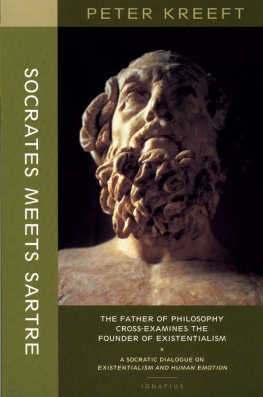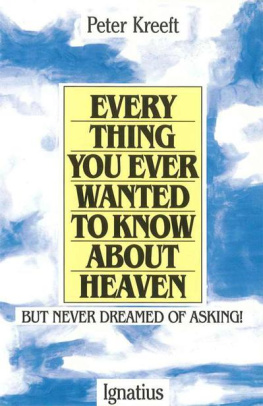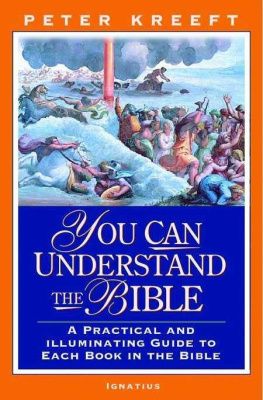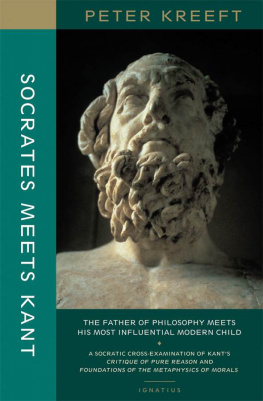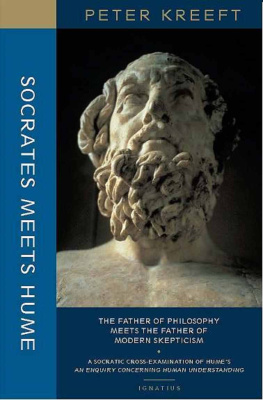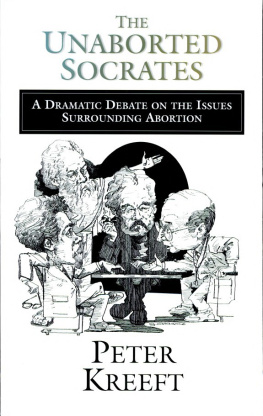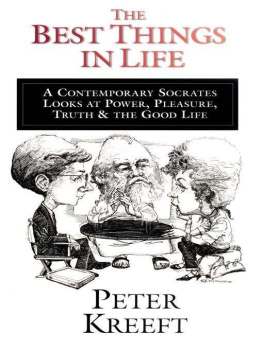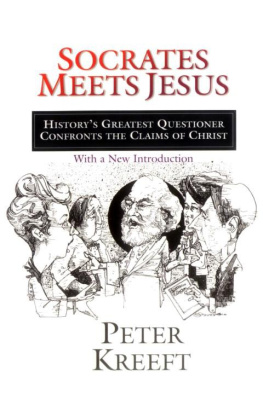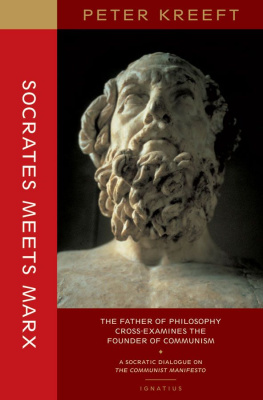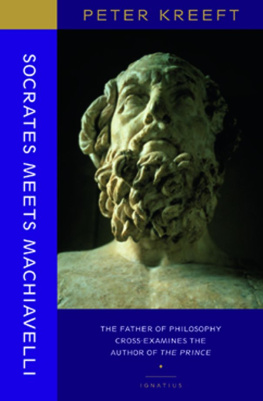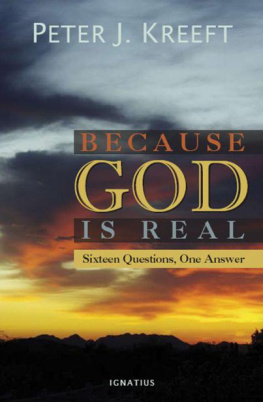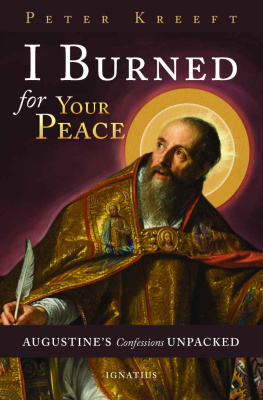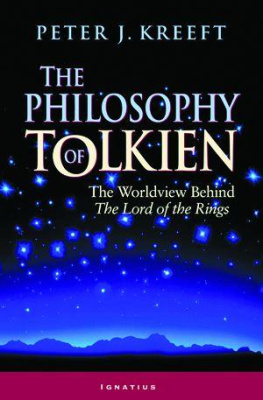Socrates Meets Sartre
Socrates Meets Sartre
__________
The Father of Philosophy Meets
The Founder of Existentialism
A Socratic Cross-examination of
Existentialism and Human Emotions
by Peter Kreeft
IGNATIUS PRESS SAN FRANCISCO
Excerpts have been used from the following books:
Existentialism and Human Emotions (EHE), (New York: Philosophical Library, 1957).
The following books were also briefly cited:
Being and Nothingness: An Essay on Phenomenological Ontology (BN), translated by Hazel E. Barnes (New York: Philosophical Library, 1956).
The Republic of Silence (RS), quoted and apparently translated by William Barrett in Irrational Man: A Study of Existentialist Philosophy (New York: Anchor Books; Random House, 1962).
La Nause (N), (Paris: Gallimard, 1938), translated by Lloyd Alexander (New York: New Directions, 1964).
No Exit and three other plays , translated by Lionel Abel (New York: Vintage Books; Random House, 1955).
Cover art: Stone Head of Socrates (469-399 B.C.)
(classic sculpture)
The Louvre, Paris, France / Bridgeman Art Library
Cover design by Roxanne Mei Lum
2005 Ignatius Press, San Francisco
All rights reserved
ISBN 0-89870-971-7
Library of Congress Control Number 2004109129
Printed in the United States of America
Contents
Introduction
This book is one in a series of Socratic explorations of some of the Great Books. Books in this series are intended to be short, clear, and non-technical, thus fully understandable by beginners. They also introduce (or review) the basic questions in the fundamental divisions of philosophy (see the chapter titles): metaphysics, epistemology, anthropology, ethics, logic, and method. They are designed both for classroom use and for educational do-it-yourselfers. The Socrates Meets... books can be read and understood completely on their own, but each is best appreciated after reading the little classic it engages in dialogue.
The settingSocrates and the author of the Great Book meeting in the afterlifeneed not deter readers who do not believe there is an afterlife. For although the two characters and their philosophies are historically real, their conversation, of course, is not and requires a willing suspension of disbelief. There is no reason the skeptic cannot extend this literary belief also to the setting.
In Hell?
SARTRE: Oh, the absurdity of it all! The absurdity! The absurdity! That I exist! Even after I have died, I still exist! How utterly nauseating! It is indeed the nausea of existence itself. There is indeed no exit from my own existence! I am in Hell, forever!
SOCRATES (to himself): He whines like a sick puppy. He pouts and preens like a bratty teenager. He drowns in the lake of his own verbosity like Narcissus. And yet this man is called a philosopher, a lover of wisdom. He was more popular in his lifetime than any other in his century. (What a century!) Thousands of adoring women flung themselves at him to be abused. I have been here in the Overworld for nearly twenty-four centuries, examining mankind, as part of their Purgatory and my Heaven, but sometimes I think I shall never understand human nature.
Well, there is mystery here, at any rate: that much is clear. Perhaps I can learn as well as teach in this encounter. But I may have to abandon my Socratic method for stronger medicines, if I am to get through to this patient. For this conversation, so that he can relate to me, I shall speak like an ordinary philosopher, not like myself. He does not see or hear me yetor anything or anyone else, for that matter.
SARTRE: Alas, alas, the absurdity of it all, the absurdity of my existence!
SOCRATES: He is indeed in absurdity, but not because of his existence.
SARTRE: It is as I thought: my very being is a being-for-itself, endlessly frustrated in its inescapable and unending attempt to do the impossible, to become a being-in-itself. But there is no exit from this self-contradiction. My own noblest possession, freedom, is my doom: I am condemned to freedom. I am doomed to failure. I am an eternal Boston Red Sox fan, under a cosmic curse.
SOCRATES: He attempts to drown himself and his misery in the ocean of his own verbiage. He is right: that attempt is doomed to failure.
SARTRE: But am I really in Hell? How can that be? Hell is other people. But I see no other people here, either my torturers or my torturees.
SOCRATES: That is because your ugly eyeballs are ingrown, like toenails, Jean-Paul. Look outside yourself for once! Look here! Look at me!
SARTRE: Oh, oh. I spoke too soon. Here comes my torturer. O cruel and cursed irony of the godsmy torturer is to be Socrates! Objective truth in a toga!
SOCRATES: It could be worse, Jean-Paul; it could have been Jesus.
SARTRE: No, no, there are no could have beens. There are no possibilities, there are only actualities.
SOCRATES: Not so. You could have been Jean-Paul the Great. But that name will be given to another, with whom you will never be confused. You are Jean-Paul the Small.
SARTRE: I do not answer to that name.
SOCRATES: But it answers to you. It hovers round your head like a halo.
SARTRE: A halo, you say?
SOCRATES: A tiny, dark halo.
SARTRE: I accept my fate: to be tortured, to be insulted, to be known by you as an object, a being-in-itself. But where is my victim? Each torturee must be a torturer as well.
SOCRATES: Not so. That pattern was broken when One became the universal torturee.
SARTRE: Not so. He is the torturer. He would be my torturer if He were present to me now.
SOCRATES: Perhaps that is why He is not present.
SARTRE: He lets you do His dirty work, then, Socrates?
SOCRATES: My work is only to explore and examine your work .
SARTRE: What work?
SOCRATES: Your best book.
SARTRE: All 700 pages of it?
SOCRATES: No, no, not Saint Genet . That was your worst book: as perverse as DeSade but infinitely duller. I mean Existentialism and Human Emotions .
SARTRE: But that was my shortest book.
SOCRATES: Precisely. And that is why it was so precise and intelligible.
SARTRE: But most of it was culled from Being and Nothingness .
SOCRATES: Yes. A good panhandler can find a few nuggets of gold even in a river of mud.
SARTRE: I can endure your Socratic questioning, and even your sarcastic personal insults, if you only answer me one little question.
SOCRATES: Just answer me one little questionthats my line. I am flattered by your plagiarism. And also curious about your question. What is it?
SARTRE: Well, as you know, I didnt believe in Hell or Heaven or Purgatory or any sort of life after death. It seems I was wrong about life after death; was I wrong about Hell too? In No Exit I used it as a metaphor for earth, for how we always inescapably deal with each other in life. Thus Hell is other people. Am I now in my own play? Is that to be my punishment?
SOCRATES: You said you had one question. By my count thats three.
SARTRE: Am I in Hell or not?
SOCRATES: That is entirely up to you.
SARTRE: Look here, Socrates, if that is really who you are, could you give me just one little gift? Could you use another instrument of torture than your famous Socratic method? I mean those teasing questions of yours, and then those long, repetitious, and insultingly elementary chains of logic that you are so in love with. Could you instead come right to the point? Just hit me, already. It will make me less cranky than your intellectual version of Chinese water torture, and whatever you want from me, youll get more out of me if Im less cranky.
SOCRATES: I promise I will try to be quick. Quicker than you were in most of your books, at any rate.
Next page
